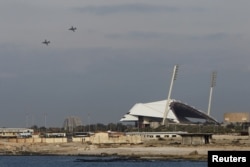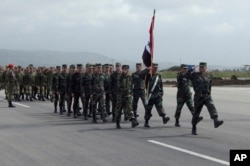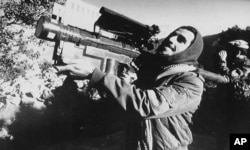In announcing a partial draw down of Russian forces from Syria this week, President Vladimir Putin insisted that Russia's nearly 6-month military campaign had largely achieved its goals.
The Russian leader pointed to the deployment of a new generation of Russian weaponry in Syria that, in Putin's words, "managed to fundamentally alter the situation in the battle against international terrorism." Putin also insisted Russian intervention in the Syrian conflict had helped secure a U.S.-Russian-negotiated cease-fire, creating the conditions for U.N. sponsored peace talks currently underway this week in Geneva.
Certainly, few would question that the Russian military campaign managed to provide a political and military lifeline to its regional ally, Syrian leader Bashar al-Assad.
Once on the verge of collapse, Assad's forces have made steady gains on the ground backed by Russian air power, securing a place at the peace talks over the objections of the U.S. and other western powers. On Tuesday, Russian state media heralded the Russian withdrawal as well-timed victory for diplomacy backed by Kremlin military resolve.
Yet analysts, politicians, and observers from across the Russian political spectrum were left to wonder over the timing of the Russian leader's decision and suggested the reasons for the Russia's sudden withdrawal were far more nuanced.
Geopolitical gains
Alexander Baunov, an analyst with the Carnegie Center in Moscow, told VOA Russia's main objective in Syria ultimately had less to do with the fate of the Assad regime and more with efforts to end its international isolation over the annexation of Crimea and proxy war in east Ukraine.
With the Russian intervention in the Syrian conflict, said Baunov, "Russia turned the page on Ukraine and forced the West into dialogue."
Ultimately, Baunov argued, the decision to withdraw from Syria was motivated by a simple desire to seize the most opportune moment for departure.
"If you want to leave, it's better to leave during a truce," said Baunov. "Because if you leave then it looks like you're a winner... And if you leave during the fighting, it looks like you're running away."
A quick exit
But in Moscow's seemingly sudden exit from Syria, Yekaterinburg-based political analyst Fyodor Krasheninnikov sees panic.
"If it was planned, you would have seen a more careful rollout of propaganda celebrating our victory," he told VOA.
Krasheninnikov added that despite stated Kremlin objectives to destroy Islamic State, the group remains a significant threat on the ground in Syria. So, too, are extremists from Russia's Northern Caucasus – another stated Kremlin goal for entering into the conflict.
Finally, Krasheninnikov points to Islamic State's downing of Metro Jet flight 9268 over the Sinai peninsula last October. The terrorist attack killed 224, mostly Russian, civilians.
"There's all this talk about Putin's victory... but I don't see it," said Krasheninnikov.
Economic pressures?
In a column for the Russian opposition website Open Russia (LINK: https://openrussia.org/post/view/13538/ ) , independent journalist Konstantin von Eggert argued Russia was simply bowing to economic realities. Faced with a weak economy due to sanctions and low world oil prices, the Kremlin could little afford simultaneous military campaigns in both Syria and Ukraine.
Moreover, von Eggert insists that if Russia's military presence gave it influence in the Syrian solution, its withdrawal just as easily risks taking it away.
"Withdrawal of troops at the very moment of peace talks, when the results of the truce are far from certain, removes Russia's most serious trump card for future negotiations," he noted.
Soviet Afghanistan 2.0
Vladimir Ryzhkov, a former Duma deputy now allied with Russia's opposition, told VOA that despite his own disapproval of Russia's Syrian campaign and the Russian leader in particular, he could only welcome the news of Russia's withdrawal as a "fully rationale move" by Putin.
Ryzkhov interprets the withdrawal as the Kremlin acknowledging that its Syrian gambit could have turned into a "second Soviet Afghanistan" -- a decade-long war that brought the deaths of thousands of Soviet troops and thousands more Afghans.
"Putin and our generals remember all too well how dangerous that region can be. Without a doubt, the Afghan experience led them to enter into Syria with a minimal presence, just as it led them to begin the process of leaving in under 6 months," said Ryzhkov.
A withdrawal in name only?
Meanwhile, questions lingered over how attainable Russia's new disengagement from Syria might be.
In Tuesday's announcement, President Putin insisted some Russian forces, backed by air power and S-400 anti-aircraft battalions, will remain at Russian air bases in Syria for the foreseeable future.
Many observers questioned whether an attack on those forces – or a breakdown in the peace process – could draw Russia back into the conflict.
Maxim Shevchenko, a journalist allied with pro-Kremlin media who applauded Russia's withdrawal as tactical move in support of the peace process in Syria, suggested in a Facebook post that Russia's military capabilities in Syria will remain formidable.
"If air defense systems remain on the bases,” wrote Shevchenko, “then what are really withdrawing?”
As if to underscore Shevchenko's point, Russia's Defense Ministry announced that -- amid the withdrawal -- airstrikes in Syria continued throughout the day.







